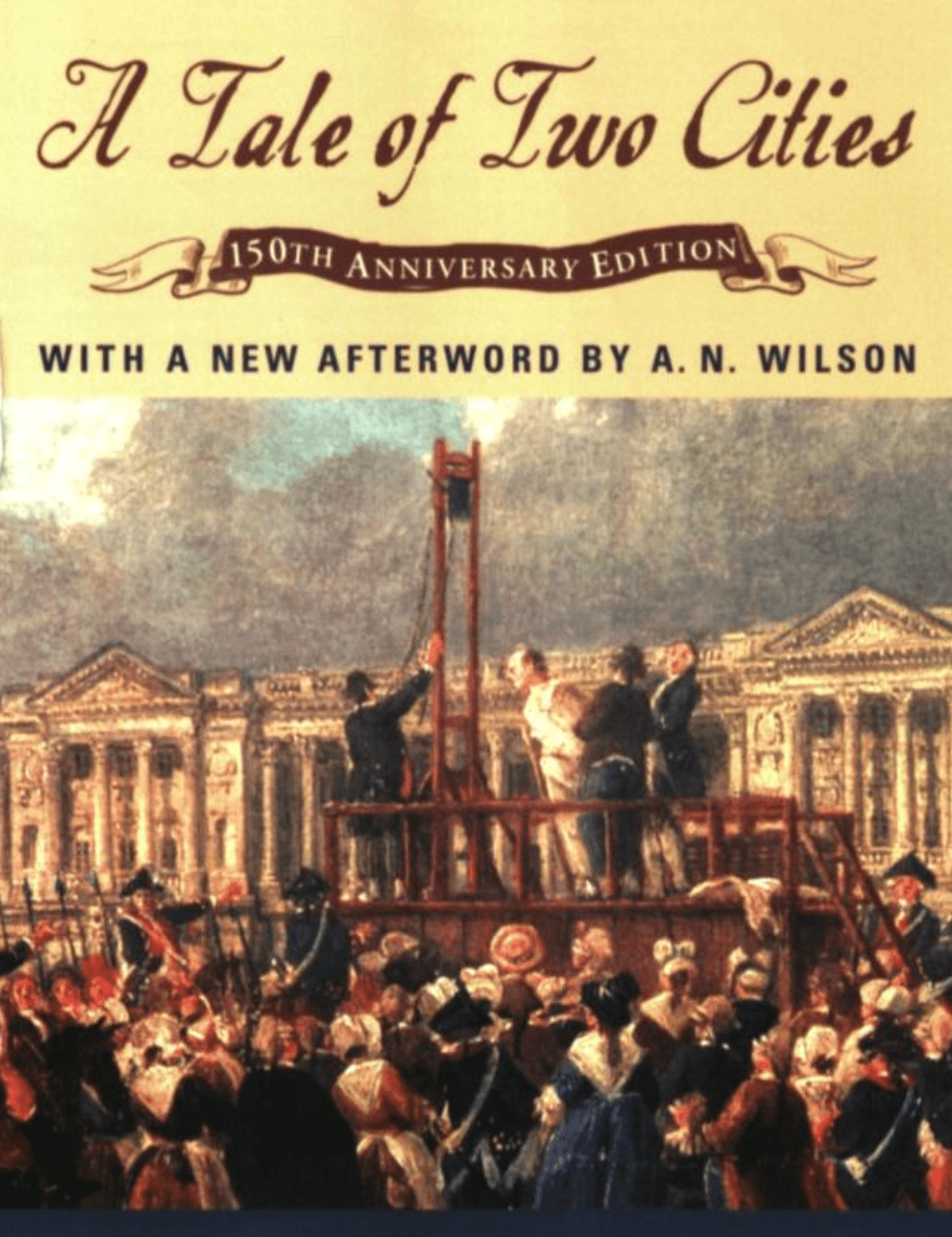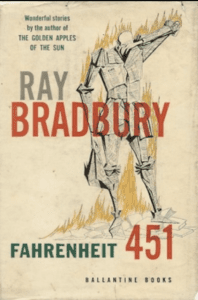The opening sentence of this mid-nineteenth century historical novel written in England is one the most famous first lines in literature. Set in the background of the French Revolution in Paris and London, the first sentence alludes to this ‘best of times’ and ‘worst of times’, the ‘age of wisdom’ and the ‘age of foolishness’. It remains one of the most enduring portraits of the Revolution, describing events around the central character angelic Lucy Manette, – the ‘golden thread’ binding all the others.
Jarvis Lorry, of Tellson’s Bank, London, travels to Paris in 1775, his coach intercepted by Jerry Cruncher, odd-job man at Tellson’s, advising Lorry to meet Lucie Manette at Dover. The enigmatic answer Jerry, the clandestine grave-robber, takes back is “Recalled to life”. Lucie, now seventeen, was brought over from Paris by elderly Lorry supposedly as an orphan, since brought up as Tellson’s ward by fiercely loyal Miss Pross. Lucie’s father Doctor Manette, believed dead, was a secret prisoner in the infamous Bastille for eighteen years, now released.
Gentle Lucie faints hearing this, but shows great compassion to her emaciated, prematurely aged father, who has lost his wits. Doctor Manette only remembers his prison identity, and obsessively makes shoes, as in Bastille, in a garret above the wine shop of Defarge, – Manette’s former servant to whom he was released, in Saint Antoine in Paris. Lucie’s golden hair reminds Manette of her mother, whose hair he carries in a paper tied around his neck.
In 1780, the Manettes and Lorry are reluctant witnesses against Charles Darnay, tried as a French spy since he frequently crosses the channel, having travelled with Darnay while returning from Paris with the doctor, now completely restored to health by Lucie’s love and care. Dubious characters Cly and Barsad provide false testimony against Darnay, but Sydney Carton, the associate of Darnay’s counsel Stryver, draws Stryver’s attention to Carton’s remarkable resemblance to Darnay. This confuses Barsad, leading to Darnay’s acquittal.
A large wine cask breaks near Defarge’s wine shop, the poor lapping up wine from the streets. Playful Gaspard writes ‘Blood’ on the wall with wine. Ruthless aristocrat Marquis St. Evremonde runs over Gaspard’s child on one of his mad rushes through the city in his carriage, condescendingly throwing a gold coin in compensation. Someone throws it back at him, and Madame Defarge, perpetually knitting a register of offenders, takes note.
Gaspard hides below the carriage, and next morning Evremonde is found killed with a note signed ‘Jacques’. The rebels greet each other as ‘Jacques’, a derisive name aristocrats call lower classes. Captured after months, Gaspard is hung high above the village well. Evremonde is Darnay’s father’s identical twin, and Darnay his sole heir. Darnay uses the Anglicized form of his mother’s maiden name D’Aulnais, renouncing his title and property, earning his living as French language tutor in London.
Doctor Manette’s house in a quiet corner of Soho is regularly visited by Lorry, Darnay and the lawyers. Overbearing brazen Stryver needs intelligent skilled Carton, called Stryver’s jackal, to analyze his cases through the night for him. An alcoholic lounging through life in sullen apathy in spite of superior abilities, Carton loves Lucie to distraction, but considers himself unworthy. Lorry advises Stryver against making Lucie an offer of marriage. Carton bares his soul to Lucie calling himself incorrigible and profligate, telling her earnestly, “there is a man who would give his life, to keep a life you love beside you”.
Manette stops Darnay from disclosing his true identity before approaching Lucie. Agitated, Manette compulsively returns to shoe-making and pacing his room that night. Another severe attack follows Darnay’s disclosure on the morning of his wedding with Lucie. After the newlyweds leave on a trip, Manette relapses into insanity; upon recovery urging Pross and Lorry to keep this a secret, who destroy Manette’s shoe-making kit.
Darnay moves in at Soho, a daughter is born to Lucie, and then a son, who dies. Carton visits sometimes, bonding with little Lucie. In 1792, when little Lucie is nine, Darnay sees a letter addressed to Evremonde at Tellson’s, taking it promising to deliver to Evremonde. Manette forbade Darnay to reveal his identity, even to Lucie. Written by Gabelle, Evremonde’s tax collector, imprisoned in the absence of the emigrant Evremonde after the chateau is burnt, the letter prompts Darnay to secretly leave for Paris.
Arrested on arrival, Darnay finds refined people as fellow prisoners, while lowly ruffians sit in judgement over them. The note he left brings his family to Paris. Aristocrat Darnay remains in prison for fifteen months without being beheaded by La Guillotine, only because Manette has a charmed existence as ex-inmate of Bastille, and skilled physician healing everybody. Manette’s history becomes his greatest strength, which gets Darnay released.
Darnay is recaptured within hours denounced by the Defarges, and allegedly by Manette in a testimony unearthed from his cell by Defarge during the storming of Bastille. Young Doctor Manette was called by twin brothers to attend to a delirious dying woman, whose dying brother told Manette the Evremonde brothers raped his sister and worked her husband to death, their father dying in grief, while he was stabbed on retaliating. Manette was incarcerated when his silence could not be bought, and condemned Evremondes to the last of their race.
Carton arrives and blackmails Barsad, whom Pross recognizes as her brother, now a turnkey who can let Carton into Darnay’s cell. Manette again loses his sanity. Carton eavesdrops on Madame Defarge’s revelation that she is the youngest sister of Evremonde’s victims, determined to see Evremonde’s wife and child guillotined. Exchanging clothes with Darnay and drugging him, Carton calmly takes Darnay’s place in the guillotine, befriending a young innocent seamstress in his last moments. Darnay is driven to safety by his family and Lorry with Carton’s travelling papers. Pross follows them after a skirmish with Madame Defarge, in which Madame Defarge’s gun is accidentally discharged and kills her. Pross goes permanently deaf from its report.




